Modèles opérationnels
Le rapport « La situation mondiale des transferts monétaires » du CALP Network identifie plusieurs types de modèles opérationnels, dont les consortiums et les alliances, les mécanismes de distribution des transferts partagés, un modèle de distribution des transferts monétaires articulé autour d’une seule organisation et l’intégration de systèmes.
« La structure générale au sein de laquelle les organisations travaillent conjointement […] pour distribuer les transferts monétaires […] lors d’interventions et d’activités d’analyse, et de la conception et de la mise en œuvre de programmes. »
Notre définition d’un modèle opérationel
Accroître l’échelle des transferts monétaires permet de transformer la manière dont l’aide humanitaire est distribuée. Cette décision a des conséquences sur les rôles des organisations dans le cadre de plusieurs modèles opérationnels, et sur la capacité des modèles à établir un lien avec les systèmes de protection sociale. Un changement d’échelle aura également un impact sur les partenariats avec des fournisseurs de technologies et de services financiers et sur la manière dont différents modèles interagissent avec d’autres formes d’assistance.
Priorités actuelles
Depuis fin 2016, le CALP Network assure la coordination d’un programme d’apprentissage visant à répondre aux questions suivantes :
- Quels sont les modèles opérationnels disponibles pour les organisations mettant en œuvre les transferts monétaires ?
- Comment différents modèles ont-ils amélioré l’efficience, l’efficacité et la transparence des transferts monétaires dans divers contextes ?
- Quels sont les modèles opérationnels les plus appropriés dans chaque contexte ?
Nous continuerons de compiler et diffuser notre base de données probantes sur les modèles opérationnels.
Nous sommes également partenaire du consortium Cash Monitoring, Evaluation, Accountability, and Learning Organizational Network (CAMEALEON), piloté par le Conseil norvégien pour les réfugié·es, qui est responsable du suivi et de l’évaluation indépendantes du programme d’assistance monétaire à usages multiples du PAM au Liban. À ce titre, nous menons des recherches et des analyses concernant l’optimisation des ressources et la redevabilité au sein du modèle opérationnel.
Contenu présenté

Operational Models: Accountability to affected people
Webinar

MEAL in Emerging Operational Models
Webinar

CTP Operational Models Analytical Framework
Guidelines and Tools
The State of the World’s Cash Report launched by the CALP Network in February 2018 highlights trends in the uptake of various operational models for the delivery of cash at scale in humanitarian response. Current decision making on the choice between these various operational models is highly influenced by context, and by the policies and approaches of donor agencies. Decision making on...
Thematic lead
Contenu récent

Colombia and Lebanon Evaluation Report: Measuring the impact of cash on child protection outcomes
Report
As humanitarian crises break down traditional protection mechanisms and the loss of income restricts access to basic resources, children become increasingly vulnerable to abuse, neglect, exploitation, and violence. Cash and Voucher Assistance (CVA) is a critical modality that is increasingly being adopted...

Cash & Voucher Assistance (CVA) & Child Protection (CP) Global Study – Research Report in the DRC, Egypt, Lithuania and the Philippines
Report
Since 2022, Save the Children has been scaling up its use of CVA for Child Protection (CP) programming through various pilot projects.
Research was commissioned in four countries in 2022-23 to generate evidence and learning to inform the design of future programming but also to design a robust...
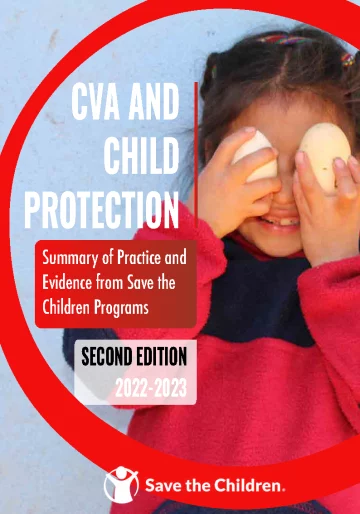
Cash and Vouchers Assistance (CVA) and Child Protection: Summary of practice and evidence from Save the Children programmes 2023 Edition
Report
In an effort to increase global knowledge and learning, Save the Children conducted a global review of twenty Country Offices and their programs in order to assess and highlight the impact that different forms of Cash and Vouchers Assistance (CVA) have on Child Protection (CP) outcomes, to identify...
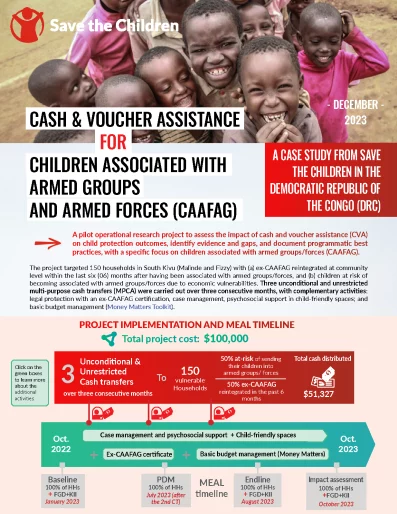
Cash and Voucher Assistance (CVA) for Children Associated with Armed Groups and Armed Forces (CAAFAG): Program Summary and Evidence-Building Infographic: A case study from Save the Children in the Democratic Republic of the Congo (DRC)
Case Study
This infographic gathers key programmatic data from Save the Children CVA operations in the DRC (South Kivu) between October 2022 and October 2023, which aimed to assess and highlight the impact that CVA has on child protection outcomes, with a specific focus on children associated with armed...

Addressing Negative Socioeconomic Impacts of the COVID-19 Pandemic through Social Protection in Viet Nam – Supporting incomes and livelihoods with cash assistance in Dong Nai province
Case Study
In late April 2021, Viet Nam faced its fourth wave of COVID-19, with over 895 000 new cases reported. COVID-19 and related restrictions hindered livelihood options and vulnerable households faced financial stress to cover basic needs. Some of them lost their income and were unable to return to home...
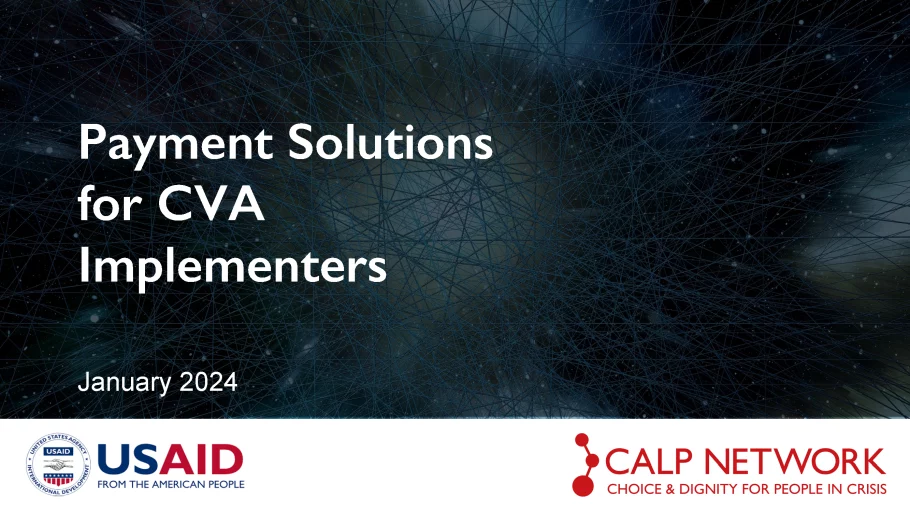
Payment Solutions for CVA Implementers
Report
This report explores how CVA implementers can leverage developments in payment technology to empower recipients, offering them a choice of CVA delivery mechanisms.
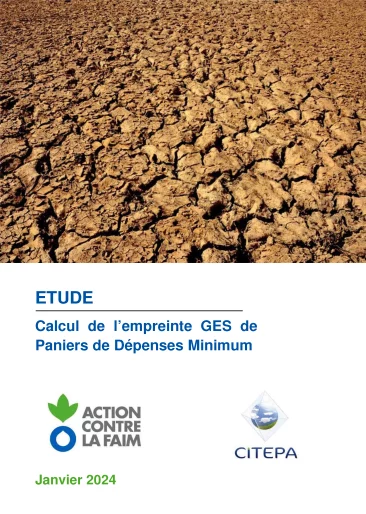
Calcul de l’empreinte GES de Paniers de Dépenses Minimum
Case Study
Début 2021, Action contre la Faim (ACF) France a lancé une évaluation des émissions de GES avec d’autres membres du Réseau Environnement Humanitaire (REH). La portée de la comptabilisation cible toutes les émissions, et très rapidement certaines activités, pouvant générer une variabilité...
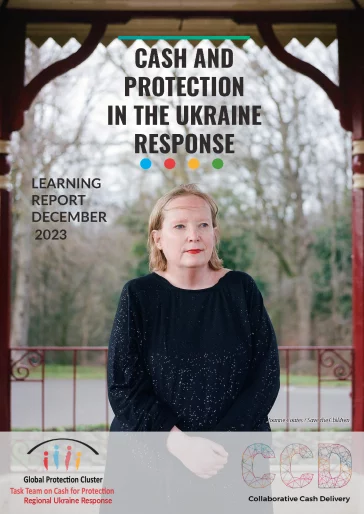
Cash and Protection in the Ukraine Response
Report
This learning report stems from bilateral discussions with the Collaborative Cash Delivery (CCD) Network’s members in Ukraine and Poland, many of whom were on the cusp of designing or implementing C4P programmes as part of the Ukraine response and were seeking learning and experience from each other.

Will our Opinion Matter? Community consultations on the design of multi-purpose cash programmes in Lebanon
Report
Since late 2019, Lebanon has been grappling with a severe economic and financial crisis. The Lebanese lira has lost more than 98 percent of its value, and over half of the Lebanese population is estimated to be living in poverty. The Government of Lebanon and development and humanitarian agencies have...
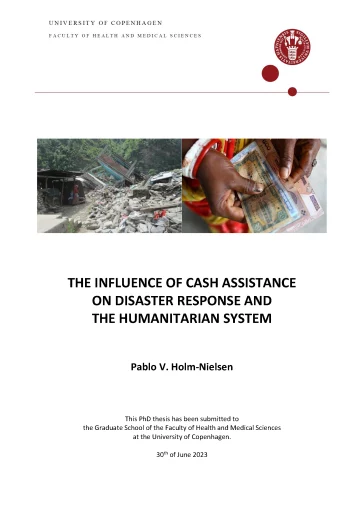
The Influence of Cash Assistance on Disaster Response and the Humanitarian System
Report
The research presented in this thesis is based on four studies that cover various aspects of the
transformative effect of CVA on humanitarian organizations and the humanitarian system. Study 1 shows the changes that the humanitarian organizations have experienced due to the shift to CVA. New skillsets...

WVI Cash Roadmap 2.0 – New Avenues – Leveraging, multiplying “Nexus” cash to take children and their families further than imagined
Policy paper
WVI's strategic global Cash Roadmap 2.0 (2024-2027) speaks to the organisations' commitment that amidst polycrises and resourcing constraints, there is urgency to maximise and multiply World Vision's capabilities, assets and cash voucher programming (CVP=CVA) is a powerful tool to do so.
Increasing...

Working with Financial Service Providers to Provide Emergency Cash Assistance
Guidelines and Tools
This report, prepared and published as part of VenEsperanza’s research and learning agenda, presents lessons learned and best practices related to the collaboration between humanitarian actors and financial service providers (FSPs) in delivering multi-purpose cash assistance in emergency contexts. Using...

Making the Most of Cash at Scale: Policy paper
Policy paper
This Policy Brief draws out key messages from Mercy Corps’ Cash at Scale study and makes recommendations for the better use of cash at scale. This explores the potential of cash at scale to meet increasing humanitarian needs and deliver people-centric response.
For Mercy Corps, cash at scale to date...

What’s Next for Cash: Mercy Corps’ approach to cash and voucher assistance
Presentation
The brief outlines Mercy Corps' CVA approach & standards applied across our CVA portfolio and sets the direction for CVA in Mercy Corps moving forward.
The approach outlines how CVA contributes to Mercy Corps Pathway to Possibility strategy by focusing on areas that drive impact & sector leadership,...
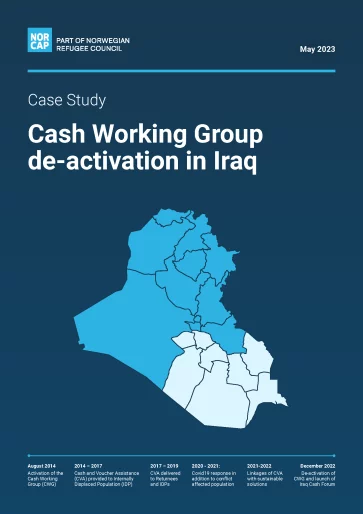
Cash Working Group De-activation in Iraq
Case Study
The humanitarian context in Iraq has evolved significantly in the past years, advancing towards recovery and sustainability for the conflict-affected population. During 2022, the humanitarian coordination structure worked on a process to phase out, in line with the transitional context. Clusters and the...
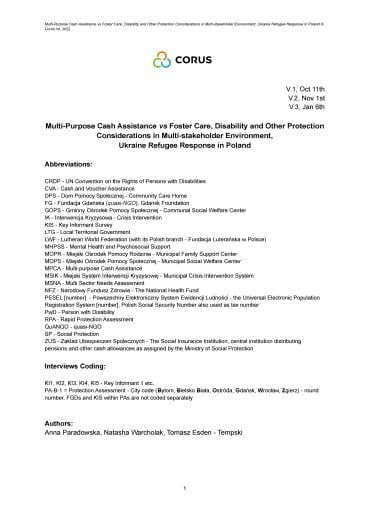
Multi-Purpose Cash Assistance vs Foster Care, Disability and Other Protection Considerations in Multi-stakeholder Environment, Ukraine Refugee Response in Poland
Case Study
This short research paper on strategic linkages between localized cash response, protection and social protection in Poland offers medium dive into the subject matter. The methodology involved both desk-based analysis, visits and interviews as part of a qualitative survey focused on the response in the...
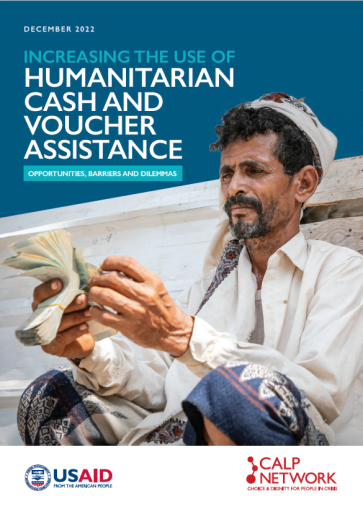
Increasing the Use of Humanitarian Cash and Voucher Assistance: Opportunities, Barriers and Dilemmas
Report
Through in-depth analysis of the latest data and careful modelling this study maps the current scale of CVA, and unpacks the opportunities and challenges involved towards it fully reaching its potential.
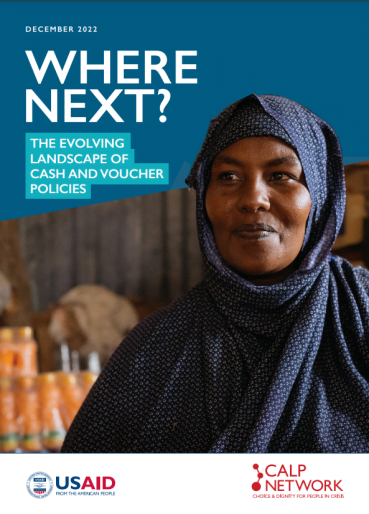
Where Next? The Evolving Landscape of Cash and Voucher Policies
Report
An exploration of how early policy commitments impacted the evolution of CVA, and what the CVA policy landscape looks like now.
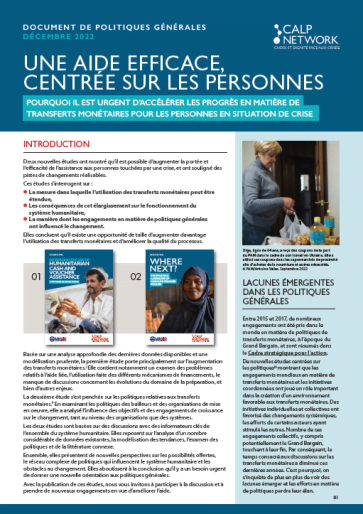
Une aide efficace, centrée sur les personnes : pourquoi il est urgent d’accélérer les progrès en matière de transferts monétaires pour les personnes en situation de crise
Guides et outils
Ce document de politiques générales, qui présente des arguments clairs en faveur de l'action, expose les dernières données probantes et informations sur la manière dont les transferts monétaires sont utilisés, et indique s'ils atteignent leur potentiel en matière de soutien aux personnes en...
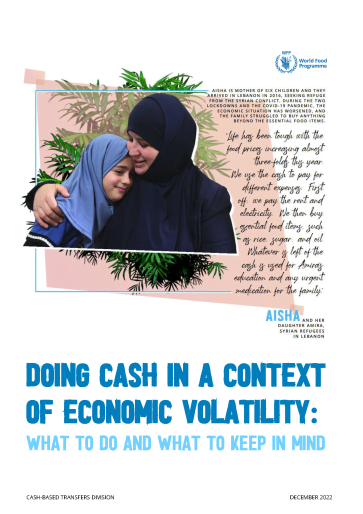
Doing Cash in a context of economic volatility: What to do and what to keep in mind
Guidelines and Tools
This interim WFP guidance was issued in 2022 to provide support to cash operations in contexts of economic volatility, be it when there is inflation, depreciation or currency volatility, parallel exchange rates, liquidity issues and changes in financial regulation, among others.



